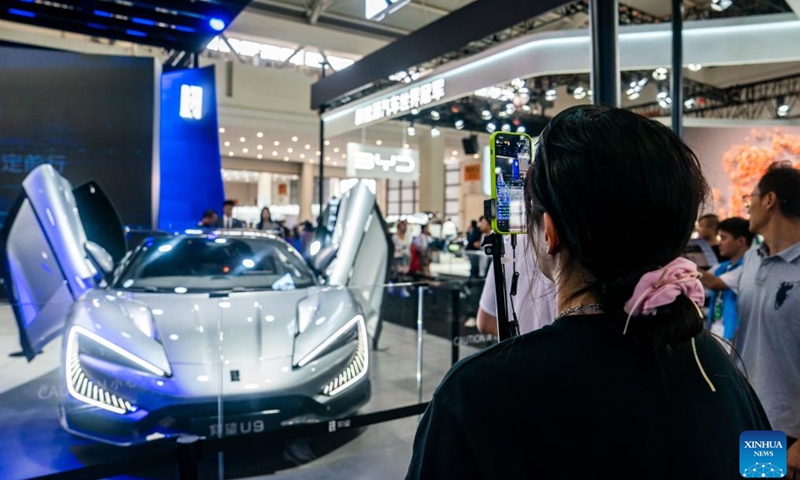
An internet influencer introduces a vehicle via livestreaming at the 25th China Kunming International Automobile Expo in Kunming, Southwest China's Yunnan Province, June 27, 2024. (Photo: Xinhua)
Chinese automaker SAIC Motor Corp is reportedly considering building its first electric vehicle (EV) factory in Europe in Spain to produce MG-branded EVs. Chinese observers said the move is common among international automakers amid rising local demand. They urged the EU to create a fair and transparent business environment for Chinese companies, saying that the EU should cooperate with China to improve the mutually-independent EV industrial and supply chains to deliver win-win results.
SAIC Motor Corp's MG brand is considering building its first EV plant in Europe in Galicia, Spain, to produce EVs for sale to different European markets, Europa Press, a Spanish news agency, reported recently, citing company sources.
SAIC Motor told the Global Times on Tuesday that the company will disclose relevant information once a final decision is made.
"It's common to see international automakers to build factories in the markets where they sell to tap great market potential, for example, Germany's Volkswagen and BMW and US automaker General Motors have facilities in China," He Weiwen, a senior fellow from the Center for China and Globalization, told the Global Times on Tuesday.
As for SAIC Motor, building a factory in Europe will help the company avoid high tariffs imposed on its EVs. Meanwhile, this is what the EU wants to see as the move will help create a large number of jobs, contribute tax revenue and meet the EU's green transition, He said.
France would welcome China's electric vehicle giant BYD if the company wants to open a factory in France, Finance Minister Bruno Le Maire said in May, Reuters reported.
Currently, the EV industries of China and the EU have gradually formed an industrial and supply chain that is highly interdependent. Against this backdrop, encouraging mutual investment from both sides' companies will further improve China-EU EV industrial and supply chain and bring win-win results for the sustained development of both sides' EV industry, He said.
However, as the
EU continuously escalates trade frictions with China, and has imposed 31 restrictive trade and investment measures against China since the beginning of this year, it is further deteriorating the EU's business environment for Chinese companies, according to analysts.
On July 4, the EC ruled that the individual duties applying to the three sampled Chinese producers are 17.4 percent for BYD, 19.9 percent for Geely and 37.6 percent for SAIC. Other EV producers in China, which cooperated with the investigation but were not sampled, are subject to the 20.8 percent weighted average duty.
Following the EC's announcement,
SAIC Motor said it would formally demand the EC hold a hearing on the tariffs as the company seeks to further exercise its right of defense for safeguarding its own legitimate rights and interests as well as the benefits of its global clients.
The auto sector is a pillar industry for the EU, which is important for the bloc's economic growth and social stability since it creates millions of jobs. For China, the EV sector also plays an important role in driving up exports. Thus, the two sides should appropriately deal with EV trade frictions with talks, analysts said.
"The EU's abuse of trade remedy measures will further disrupt global trade order of the new-energy industry and cause negative impact on global cooperation in handling climate challenges," Cui Fan, a professor of University of International Business and Economics, told the Global Times.
Cui said the EU's EV trade barriers will make EU automakers face a dilemma, as it will cause troubles for their EV products made in China to export to European market and thereby impede these automakers' electrification transformation.
In the future, China's EV participants must seek to strengthen cooperation with developing countries, with diversified methods including building factories locally and exporting intermediate products to make better use of global resources, Cui said.
In February, the Ministry of Commerce and eight relevant departments jointly released a guideline to support the healthy development of trade and cooperation involving new-energy vehicles. It called for enhancing the capability and level of international management, and strengthening collaboration with relevant overseas enterprises according to local conditions.




